- Home
- Will McIntosh
Hitchers Page 12
Hitchers Read online
Page 12
I read along where Summer was pointing. His language was gaudy, but it did sound eerily familiar.
“According to him everything has consciousness,” Summer went on, “animals, plants, planets, stars—but the various forms of consciousness aren’t interchangeable. The consciousness of a star can’t inhabit a human body, and vice-versa.
“So if they came through, the dead would have nowhere to go but into people,” I said.
“Charming,” Mick said.
Two months ago I’d have rolled my eyes at this sort of supernatural stuff. I was still skeptical that some mystic’s fifty-year-old book held the answers we were looking for, but it didn’t seem all that far-fetched, either.
“Why would I pay to eat food in a restaurant that I can cook myself?” Mick blurted. Heads turned to stare, but we ignored them. Mick was probably used to people staring at him.
“How did he figure all this out?” I asked. “Does he say?” Summer tilted her head back to look at me, breaking into a wide smile. “Oh yeah, he says.” She flipped through more pages, stopped on a page with multiple exclamation points in the margins. She tapped the page. “He claims he visited the other side. ‘The world of the dead’ he called it. Actually saw it.”
I guffawed. Couldn’t help it. Even with my grandfather taking up residence in my body, this sounded way over the top.
“How did he do that?” Mick asked, eyeing the pages as if they might explode at any moment.
Summer flipped to the next page, which was marked by a powder-blue Post-it. “He spent years fine-tuning his consciousness until he could enter a deep trance state, aided by mescaline.”
Mick leaned back, chuckling. “I figured heavy drugs had to be involved somehow.” He tapped the page with his fingernail. “I think I’ve been to the very same place a few times, only it was heroin that got me there. I preferred the opiates in my high-flying days.”
Summer smiled at the joke, flipped a few more pages.
I skimmed the browned pages of Krishnapuma’s book, catching random snippets as they flew by:
...gathered up in the darkening wind... drawn by the dwindling dead... my bodiless presence...
He had a melodramatic delivery, that much was certain. Whether any of it was true... at this point I didn’t know what to think.
“Maybe this guy visited this land of the dead and maybe he didn’t, but how does it help us?” I asked. “How does it get my grandfather to go away?”
Once again Summer craned her neck to grin up at me. “Easy. You’re going to go there.”
“Go where?”
“The world of the dead.”
I laughed, because I thought she was joking. “How the hell would I do that? I don’t have years to fine-tune my awareness. Or any mescaline.”
Summer held up the book, her finger holding her place. “Krishnapuma didn’t have this to guide him. And Krishnapuma wasn’t halfway there to begin with.”
“I’m halfway to Deadland?”
“The world of the dead,” Summer corrected. She flipped open the book and read a passage: “‘Those who have touched death, however briefly, tread with one foot in the world of the living and the other in the world of the dead.’ That’s why you and Mick are ahead of the others who have this thing. You were in the world of the dead when it happened.”
“Lucky us,” Mick said, exhaling smoke from his cigarette. He had been blurting so often he seemed reluctant to speak for long, like a person with hiccups who is tormented by anticipation of the next one.
Summer flipped through her notes. “There’s so much more. Krishnapuma predicted that it might be possible for a rift to open between the two worlds, allowing the dead to pour into the world of the living.” She held up a finger. “And listen to this: ‘When a conscious being leaves its physical form, it dissolves back into the all, the place from which all consciousness arises. This process takes time; how much depends on the being’s willingness to let go of the illusion of his own individuation.’”
“That’s lovely. I have no idea what it means, but it’s lovely.” Mick heaved a big sigh. “Is it possible we’re all just going mad? Doesn’t that make more sense than thinking we’ve each got someone dead inside us?” As if to underscore this, he blurted, “Is it mint? If there are scratches I’m not interested.” A red-faced guy in a white windbreaker glanced at Mick from the adjoining stool, swept his drink off the bar and moved away. It was becoming clearer it was a man’s voice; the tenor was coming through stronger than ever.
“The thought has crossed my mind,” I said, “but that wouldn’t explain how Summer could know so much about Lorena.”
“I know, I know.” Mick drained his glass. It made a solid thunk as he set it back on the table. “Wishful thinking.”
“But how did it happen?” I asked. I lowered my voice. “I mean, if we’re all possessed, why are we all possessed?”
Mick shrugged. “Has to be the anthrax attack. No way the timing’s a coincidence.” Another blurt followed—something about wanting pizza before bed—then another almost on top of the first.
“What if it’s not so much the anthrax, but so many people dying at once?” Summer suggested. “Have so many people ever died at once before?”
I opened my mouth to suggest Hiroshima, or the fire-bombing of Dresden, but neither had killed six hundred thousand people. Millions may have died from the bubonic plague in the middle ages, but that was over a couple of years. Plus the deaths were spread over a much larger area. Same with the flu pandemic of 1918.
“I don’t think so,” I said. “Over half a million people in four or five days?” Something was niggling me about all this. I rotated my glass, thinking, trying to get a grasp on it. Then I had it. “But hold on—Grandpa didn’t die in the anthrax attack. Why would he come back?”
I had to raise my voice to talk over Mick’s blurts. His forehead was damp with sweat. “Mick? You all right?” I asked, putting a hand on Mick’s back. Around us the buzz of bar patrons was rising.
Mick raised his arm like he was going to gesture at something, let it drop. His hands began to shake. “Oh, bloody,” Mick blubbered. His face was so slack he looked like he’d had a stroke. He inhaled deeply, jerkily. His hands were jerking like fish just hauled into the boat.
People left their seats. A dozen headed for the door in quick order. I knew just what Mick was going through, and I felt for him. Maybe it was easier for him because he knew what to expect.
The bar stool squeaked against the wood floor as Mick stumbled off it. He looked at us, wide-eyed.
Summer put a calming hand on his arm. “Can you tell me your name?”
“I thought I was dreaming.” His voice was the same deep, crude thing mine had been when Grandpa spoke, but he spoke fast, spitting and blubbering so you could barely understand. He looked at the mirror behind the bar, pressed his hands to his face. “I’m Mick. This is unbelievable.” He looked at me. “He can hear me, right? Isn’t that how it works? That’s how it was in the dream.” He stuck his hands under his arms like he was cold.
“That seems to be how it works,” I agreed.
“Mick!” He called, looking at himself in the mirror. “Gilly here.” He held up his hands as if warding off a blow. “Now don’t get mad. I’m sorry about all that legal stuff. That’s all behind us now, okay?”
“I’m sorry,” Summer said. “Gilly?” She held out her hand. “I’m Summer.” Gilly studied Summer’s palm, then held out Mick’s quavering hand, dangling loosely at the end of his wrist. “Hey.”
“Can you tell me your last name?”
“I’ve been watching you.” He pointed at the mirror.
Summer nodded. “Can you tell me your last name?”
He touched Mick’s lips. “What’s happening to me?” He had a thick New York accent that came through despite the wet, croaking timbre of his speech. There was no trace of Mick’s cockney British.
“Hansen,” I said. “His last name is Hansen.” Summer looked at
me, her head tilted, questioning. “He co-wrote most of Mick’s big hits.”
“I was also in the band for a while.” He looked around the bar, as if he’d just noticed where he was. “Did I die or not?”
“What’s the last thing you remember, before you started seeing through Mick’s eyes?” Summer asked.
“The wind,” he said. “Music going through my head, on and on and on and on and on. That’s why I’m back. I need to find my notes and get back to work.” He looked at the mirror, raised his voice. “I been working on something new for you, Mick. It’s good, really good. I promise. Not just a retread—”
“Wait a minute, back up,” Summer said. “Why are you back?”
Gilly held his outstretched palms over his head. “Because the gods, or the cosmos or whatever, wanted Mick and me back together. How could that be any clearer? We’re in the same fricking body.” He turned back to the mirror. “Mick, no hard feelings, right? I worked on it on the other side, in my head. It’s weird but it’s not, you know what I mean?”
“Hang on,” Summer said, grasping one of Gilly’s hands and tugging, trying to get his attention. “The other side? Can you tell us about it?”
My hands were shaking. That awful crawling sensation started up.
“Me and you, man, together again.” Gilly shook his head.
“Summer,” I interrupted, before the tingling swept over me, numbing me like a full-body shot of Novocain.
Summer looked at my hands, gave me a look that said “Don’t leave me with two dead people.”
Grandpa turned to the bald bartender, shouted, “Whiskey, neat.” He nudged my drink toward the gutter of the bar. “Scotch is for sissies and Englishmen, which is the same thing.” He pulled his stool closer to the bar as if it offended him.
“Mr. Darby, my name is Summer Locker.” She motioned to Mick. “And this is Gilly Hansen.” Gilly offered Mick’s wobbly hand.
Grandpa looked at it. “I was listening. I know who the hell he is.”
Alarmed, urgent voices carried from the far end of the bar. Someone was sobbing, “I don’t understand what’s happening” over and over. Grandpa glanced at them. Most of the patrons remaining in The Regis were standing, packed toward the entrance as if watching an avant-garde play. Most looked scared shitless, though a woman with dyed red hair was snapping pictures with her phone.
“Do you remember the other side?” Summer asked Grandpa. Grandpa shrugged. “I got nothing to say to you, missy. Why don’t you jump in front of a bus and go there yourself.” He jerked a thumb at the door.
“Wait. You were dead too?” Gilly asked.
The bartender ventured within a few paces of us. “I think you should leave.”
“I think you should go to hell,” Grandpa shot back. “Pour my drink, and be quick about it.” The bartender retreated down the bar.
“Really, what was it like?” Summer persisted, staring Grandpa down, daring him to engage her.
The bartender slid Grandpa’s drink down the bar from ten feet away. It slid past Grandpa’s spastic grip. Summer caught it, set it in front of Grandpa without dropping her gaze.
Without bothering to thank her, Grandpa took a swig, exhaled loudly as the whiskey burned the back of my throat. “It’s like nothing. At least after a while it is. At first it’s like a drunken dream.”
His voice was still a croaking mess, but not as bad as last time. He was learning how to use my mouth, forming sounds more clearly with practice. The slackness was leaving his face as well. I barely recognized my face in the mirror behind the bar. The muscles around my eyes were pinched, my lips pulled into a frown. My grandfather’s features seemed to be bleeding through—his cheeks like angry boils, his beady eyes.
“So what are you doing back? Usually when you die, that’s it. You know?” Summer asked.
Grandpa took another pull, swallowed the thick whiskey. “How the hell do I know? They don’t hand out instruction manuals over there.” He motioned to the bartender, pointed at his empty glass. “But if I had to guess, I figure there’s going to be a little less Finnegan Darby and a little more Thomas Darby every day.” He smiled with satisfaction, checked my watch.
The significance of what he said roared in my head. He couldn’t know for sure, but it made sense. It started as just a voice, and each day it got worse. What would happen to me if he took over for good? Would I stay in here, helpless, for the rest of my body’s life?
Summer turned to Gilly, who was watching the proceedings with dumbfounded fascination.
“How about you, Gilly? What was it like for you?”
“What is this?” Grandpa interjected. “Who are you, Larry King?”
“What was what like?” Gilly asked.
“Being dead.”
Gilly shook his head. “I heard what you were thinking of doing. You don’t want to go there. Not if you don’t have to.”
A camera flashed. A guy with a high-speed camera was halfway to our table, snapping photos.
“Hey, stop that,” Summer said. The guy ignored her.
Mick’s face began to shake, the loose skin under his chin jiggling. Gilly moaned, shut his eyes.
The slackness in Mick’s face vanished into a grimace. “Bloody hell!” Mick cried. “Christ.” He pounded the bar with his fist as the camera flashed again.
Summer pushed his scotch in front of him. “Welcome back.”
Mick downed the scotch. “We have to sort this out. I don’t want to go back in there.” He wiped his mouth with the back of his hand, signaled for another drink.
“I’m with you,” Summer said. She turned. “Where are my manners?” she added, dripping sarcasm. She flicked her hand in Grandpa’s direction. “Mick, this is Finn’s grandfather, Thomas Darby.”
Mick pulled a pack of cigarettes from a vest pocket in his jacket, shook one out, and lit it with a badly trembling hand. “Fuck off.”
Grandpa lifted his glass. “Well pardon me if I don’t shed a tear. Lousy drug addict.”
That blessed vague tingling, like a low-level electric current, spread down my arms and legs. The glass dropped from Grandpa’s hand, splashed whiskey on my jeans before shattering to the tile floor.
I took a deep, ragged breath. “No, it’s me. I’m back, too.” I buried my face in my hands, stifled a sob of relief. “So now we know who Mick’s ghost is.”
“I knew who it was,” Mick said, lighting his cigarette with still-shaking hands. “I just didn’t want to admit it to myself. The sodding bastard was trying to block me from performing my own songs when he keeled over. I was glad to see him go. I threw a bloody party.”
“Did he die in the anthrax attack?” I asked.
“Him?” Mick rolled his eyes. “He ate himself to death. Diabetes or some such. You heard him mention he used to be in the band? That was in the early days, before we made it big. The wanker kept putting on weight until we had a four-hundred-pound bass player. Then he went strange on us. Stopped playing in the middle of songs, wandered the stage, went all bug-eyed and hid behind amps. A complete embarrassment, he was. Then ten years ago he slaps me with the lawsuit.”
“Um, Mick?” Summer shook her head tightly, as if attempting to signal Mick without Gilly seeing. “Sounds like he’s willing to let bygones be bygones. This might go easier if he’s on our side?”
Mick grumbled under his breath, tipped his head back and drained his glass.
Flashing red lights appeared outside the bar. A police cruiser had pulled up. Summer tugged my jacket. “Time to go.” With Mick on my heels, we stumbled out.
CHAPTER 22
Askinny, exhausted-looking kid handed me a white bag through the Wendy’s drive-through window.
“I still get the fever on a Saturday night,” Gilly sang from the passenger seat, his eyes closed, head lolling. He sounded terrible, trying to sing with that voice.
I unpacked my spicy chicken sandwich while I pulled out of the lot, burned the roof of my mouth on the first bite. I was eating to
o fast because I didn’t want to waste time eating. It had been almost sixteen hours; who knew how much longer I had before I’d be driven back inside?
“Sorry. Don’t mean to be rude,” Gilly said. “I’m working hard when I’m inside, but I can’t write anything down, and I forget stuff. It’s frustrating.” He plucked a few fries from their cardboard basket.
“Did you find the notes you mentioned?”
“Not yet. I need to make some calls. It’s hard when you only have half an hour, you know?” He licked his fingers like a dog cleaning his front paws. “I worked on this for eight years before I died. I was going to surprise Mick, give it to him as a peace offering, you know?” I nodded. I wondered if he was delusional, or if he was actually composing decent music. Mick said Gilly had lived with his mother for the last twenty-odd years of his life, in the same room he’d occupied as a child.
Gilly waggled his head, brayed sort of like a horse. “Man, wish I could clear my head. I’m not used to the pills and the booze.” He twisted the rear-view mirror so he could look into it. “Not that I’m criticizing, Mick. It’s your body; I’m just along for the ride, as long as it lasts.” He held two fingers up in a peace sign. “Back to the top, man. Me and you.”
My phone rang. It was Mom, but I wasn’t going to get to talk to her. The snakes were running free. Damn it. I was pulled back into cottony numbness.
Grandpa closed the phone, signaled, parked along the curb.
“Why are we stopping?” Gilly asked, peering out his window.
Grandpa got out without a word.
“Hey Finn?” Gilly had one foot on the pavement, his hand on the hood.
Grandpa crossed the street with its neon signs and honking cars. I had no doubt he was heading for a bar.
He turned into Cypress Street Pint and Plate on the corner of Fifth Street, stormed up to the bar and ordered a whiskey, his tone all business.
“Finn?” Gilly pulled up the stool next to Grandpa.
“I ain’t Finn,” Grandpa hissed, turning a shoulder to Gilly.
I tried to ignore their interchange; it was time to get to work, looking for Deadland. I couldn’t stomach Krishnapuma’s melodramatic and cumbersome “world of the dead,” so I had shortened it.

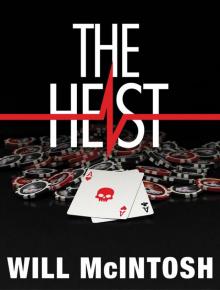 The Heist
The Heist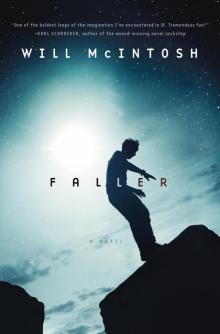 Faller
Faller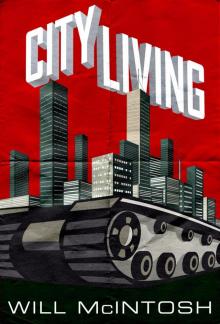 City Living
City Living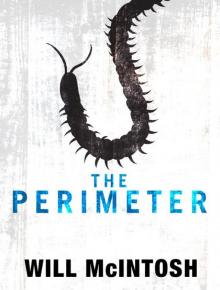 The Perimeter
The Perimeter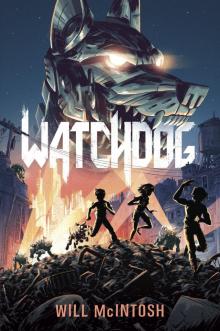 Watchdog
Watchdog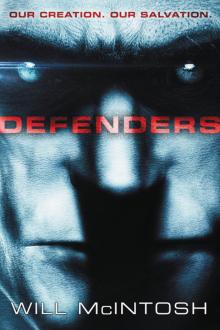 Defenders
Defenders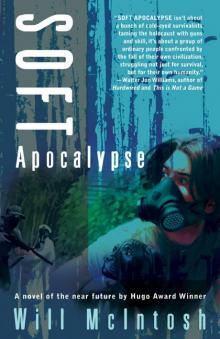 Soft Apocalypse
Soft Apocalypse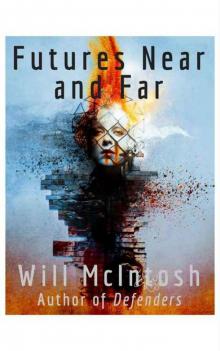 Futures Near and Far
Futures Near and Far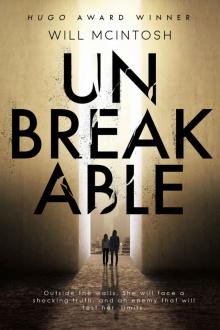 Unbreakable
Unbreakable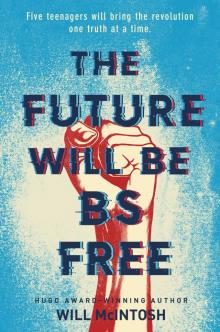 The Future Will Be BS Free
The Future Will Be BS Free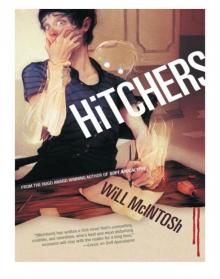 Hitchers
Hitchers Burning Midnight
Burning Midnight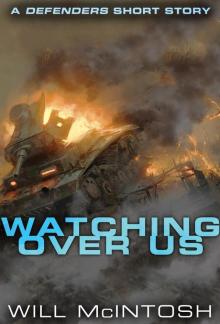 Watching Over Us
Watching Over Us